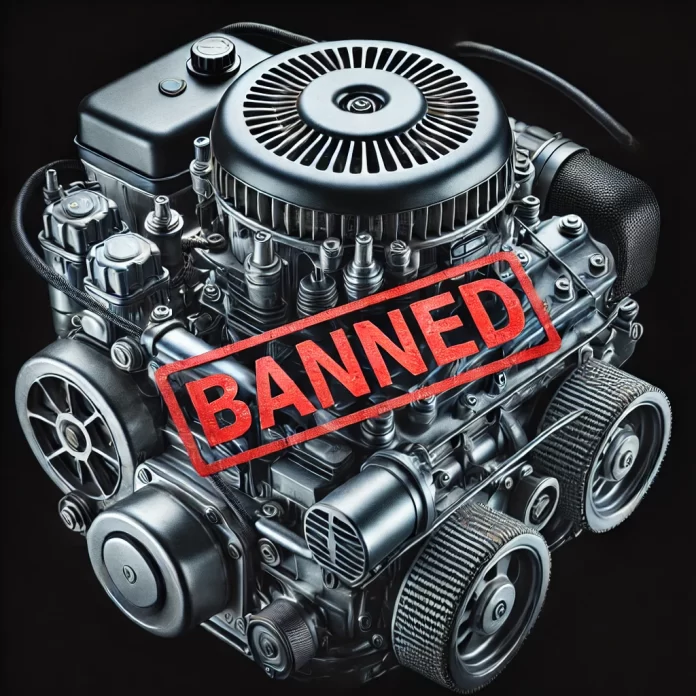The days of petrol-powered lawnmowers may be numbered, as major manufacturers begin phasing out small engines in response to environmental regulations and shifting consumer demand. While the transition is already underway in the United States, the UK market could soon face similar changes. So could we eventually get a petrol lawnmower ban in the UK?
U.S. Manufacturers Lead the Shift
Several major lawnmower manufacturers have made significant moves in the U.S., responding to growing restrictions on petrol-powered equipment:
- Honda announced in 2022 that it would cease production of petrol lawnmowers in the U.S. by September 2023, citing “market conditions” and stricter environmental laws. The company is selling off its remaining stock through 2024.
- John Deere has already discontinued its pedestrian (walk-behind) mower range, shifting focus to ride-on and robotic mowers.
- Briggs & Stratton, a leading small-engine manufacturer, faced financial struggles and filed for bankruptcy in 2020. It has since restructured and is investing in battery technology to align with market trends.
The driving force behind these changes is legislation. California, a trendsetter in U.S. environmental policy, has banned the sale of new petrol-powered lawn equipment from 2024 under the Small Off-Road Engine (SORE) regulations. Other states could follow suit, making petrol-powered lawnmowers increasingly difficult to sell and maintain in the U.S.
Could These Changes Reach the UK?
While the UK has yet to announce a specific ban on petrol-powered garden equipment, tightening emissions targets suggest it could be on the horizon. The government aims to achieve net-zero emissions by 2050, and petrol-powered tools, including lawnmowers, contribute significantly to air pollution.
Some local authorities are already encouraging battery-powered alternatives. London, for example, is expanding its Ultra Low Emission Zone (ULEZ), making it more costly for businesses to operate petrol-powered equipment in certain areas. As urban air quality initiatives expand, similar restrictions could be introduced nationwide.
Honda’s Different Approach in the UK
Despite discontinuing petrol lawnmowers in the U.S., Honda remains committed to them in the UK and Europe. Production has been consolidated at the company’s factory in Orléans, France, ensuring continued supply. The UK range still includes the professional HRH series and domestic Izy models, alongside its Miimo robotic mowers and battery-powered alternatives.
However, Honda’s long-term commitment to petrol models remains uncertain. If tougher UK regulations emerge, the company may be forced to follow its U.S. strategy.
The Future of Lawnmowers in the UK
Battery-powered lawnmowers are already gaining ground in the UK, with brands such as EGO, Stihl, Husqvarna, and Mountfield expanding their cordless ranges. These models offer lower emissions, reduced noise, and lower maintenance costs, making them increasingly attractive to professional gardeners.
For landscaping professionals, the transition presents challenges. Battery-powered equipment often has shorter run times than petrol equivalents, requiring multiple battery packs for all-day use. The initial cost is also higher, although this is offset by lower fuel and maintenance expenses over time.
What Should UK Professionals Do?
While petrol-powered lawnmowers are still available, professionals should start preparing for a potential transition:
- Stay informed – Watch for changes in UK regulations and local authority policies.
- Test battery-powered equipment – Trying out different models now could help ease future transitions.
- Consider hybrid solutions – Some manufacturers offer interchangeable battery systems across tools, making investment in electric more cost-effective.
Currently, several laws and regulations affect gardeners and landscapers working in London, particularly concerning emissions and the environmental impact of machinery. While specific laws targeting small machinery, such as lawnmowers and chainsaws, may not be as prominent as those for large construction equipment, there are still significant rules in place that professionals must adhere to. Here are the key regulations:
1. Non-Road Mobile Machinery (NRMM) Regulations
- These regulations primarily apply to construction equipment but are important for landscapers using larger machinery, such as mini excavators and generators.
- Under the Greater London NRMM regulations, machinery used on construction sites must meet Stage V emissions standards by 2025. While this mainly affects larger equipment, landscapers using machinery like petrol-powered generators for site work or events may need to ensure their equipment is compliant.
- Machines must be registered in the NRMM online register to confirm their emissions status, and fines are imposed for non-compliance. Although these rules are not directly targeting smaller tools like mowers, the broader push for lower emissions is still relevant.
- London Low Emission Zone (LEZ) regulations require that all non-road mobile machinery operating within London meet certain emissions standards to reduce pollution. This zone covers the entire Greater London area and could impact gardeners working in specific locations.
2. Ultra Low Emission Zone (ULEZ)
- While ULEZ mainly applies to vehicles, it indirectly affects landscapers who use petrol-powered tools, especially in urban areas like central London. If petrol-powered tools are used near residential or high-traffic areas, businesses may face stricter rules or fees based on their environmental impact.
- The ULEZ zone is expanding, and further restrictions are expected to come into force, particularly in areas with high air pollution.
3. Air Quality (Pollution) Laws
- The Clean Air Act 1993 and the Air Quality Standards Regulations 2010 govern air quality and emissions across the UK. These laws aim to improve air quality by limiting pollutants, and while they are not specific to lawnmowers and chainsaws, they influence local regulations that target emissions from gardening machinery.
- Local air quality initiatives in London may impose rules on the use of petrol-powered tools in sensitive areas, such as near schools, hospitals, or residential areas. Some local councils might encourage or even mandate businesses to use electric tools or to comply with emissions standards to protect urban air quality.
4. Noise Regulations
- While noise restrictions are not as strict as emissions laws, they play a role in governing when and where petrol-powered tools can be used. In residential or quiet zones, local councils may impose limits on noise levels, restricting the use of loud machinery like lawnmowers and leaf blowers at certain hours.
- The Control of Pollution Act 1974 allows councils to control noise from machinery and tools used in outdoor spaces, particularly in densely populated areas.
5. Waste and Recycling Regulations
- Landscaping businesses must comply with waste disposal regulations, which include managing garden waste and green materials. The Waste and Resources Action Programme (WRAP) provides guidelines on handling waste, and landscapers should be aware of the rules for recycling plant materials and disposing of hazardous waste.
- Under Environmental Protection Regulations, landscapers must ensure that the disposal of oils, fuels, and batteries from their equipment complies with environmental standards to avoid pollution.
6. Battery-Powered and Low Emission Alternatives
- Local authorities and government bodies encourage the shift toward battery-powered tools for gardening and landscaping to reduce emissions. Some councils may offer incentives or grants for businesses to upgrade to electric tools.
- Additionally, as the UK moves toward net-zero emissions by 2050, further incentives or mandates for low-emission equipment are expected, particularly as part of the country’s efforts to meet climate change goals.
7. Health and Safety Laws
- There are also laws surrounding the health and safety of workers using machinery. For example, under the Health and Safety at Work Act 1974, employers must ensure that employees working with machinery are provided with appropriate training and safety equipment. This includes the proper use of petrol-powered tools and protective gear when working with high-emission or loud machinery.
Conclusion
While specific laws for smaller gardening machinery like mowers and chainsaws are currently limited in London, the broader regulatory environment is shifting towards stricter emissions controls. These include NRMM regulations, air quality laws, and noise ordinances, which affect how and where gardening machinery can be used. As the UK moves toward more sustainable practices and London continues to expand its environmental zones, landscapers should prepare for more restrictions, with a strong focus on reducing emissions through cleaner, quieter, and more sustainable equipment.
With manufacturers and governments moving away from petrol engines, the lawn care industry is entering a new era. Whether this transition happens gradually or rapidly in the UK, professionals must be ready to adapt.




